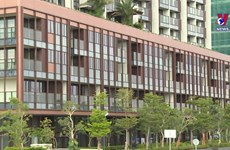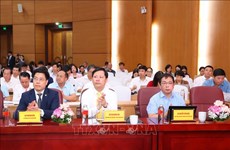Experts call for new FDI strategy
Experts have called on authorities to provide strong, clear conditions,
not merely open offers for foreign investors, before granting FDI
licences.
The new concept in luring foreign direct investment (FDI) was prompted by the fact that a number of major FDI projects have had their licences revoked or have been liquidated and shifted to other investors due to slow deployment or inefficient operations.
The new concept in luring foreign direct investment (FDI) was prompted by the fact that a number of major FDI projects have had their licences revoked or have been liquidated and shifted to other investors due to slow deployment or inefficient operations.
Experts have called on authorities to provide strong, clear conditions,
not merely open offers for foreign investors, before granting FDI
licences.
The new concept in luring foreign direct investment (FDI) was prompted by the fact that a number of major FDI projects have had their licences revoked or have been liquidated and shifted to other investors due to slow deployment or inefficient operations.
Prof. Dr. Nguyen Mai, the country’s leading expert in FDI, said the FDI strategy should focus on quality and efficiency, sustainable development, minimal carbon emissions and commitments to transfer advanced technology and skilled personnel.
He said that if advanced technology was applied to steel production, the industry may save up to 40 percent of energy and cut by half the emission of carbon to the environment.
These figures are very significant at a point when Vietnam is popular with the major world producers in steel production, which is always a leading energy guzzler, Mai pointed out.
Dr. Nguyen Minh Phong from the Hanoi Institute of Social Economy warned of risks if authorities care only about economic interests.
Management agencies and local administrations should take into account national security during the FDI project licensing procedures, especially in regard to those projects using vast areas of land, afforestation and mining located in strategic positions, Phong said.
For all these reasons, experts called on responsible agencies to make public both conditions and offers or take initiative in gaining information about foreign investors before granting licences.
These steps are necessary to avoid “bad” or “virtual” projects, and being able to apply incentives to those projects that are proven to be positive and sustainable, they argued.
The Foreign Investment Department estimated that Vietnam is expected to attract some 21 billion USD in FDI and disburse between 14 and 15 billion USD in 2010./.
The new concept in luring foreign direct investment (FDI) was prompted by the fact that a number of major FDI projects have had their licences revoked or have been liquidated and shifted to other investors due to slow deployment or inefficient operations.
Prof. Dr. Nguyen Mai, the country’s leading expert in FDI, said the FDI strategy should focus on quality and efficiency, sustainable development, minimal carbon emissions and commitments to transfer advanced technology and skilled personnel.
He said that if advanced technology was applied to steel production, the industry may save up to 40 percent of energy and cut by half the emission of carbon to the environment.
These figures are very significant at a point when Vietnam is popular with the major world producers in steel production, which is always a leading energy guzzler, Mai pointed out.
Dr. Nguyen Minh Phong from the Hanoi Institute of Social Economy warned of risks if authorities care only about economic interests.
Management agencies and local administrations should take into account national security during the FDI project licensing procedures, especially in regard to those projects using vast areas of land, afforestation and mining located in strategic positions, Phong said.
For all these reasons, experts called on responsible agencies to make public both conditions and offers or take initiative in gaining information about foreign investors before granting licences.
These steps are necessary to avoid “bad” or “virtual” projects, and being able to apply incentives to those projects that are proven to be positive and sustainable, they argued.
The Foreign Investment Department estimated that Vietnam is expected to attract some 21 billion USD in FDI and disburse between 14 and 15 billion USD in 2010./.













